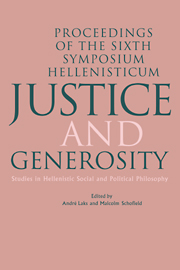 Justice and Generosity
Justice and Generosity Book contents
- Frontmatter
- Contents
- Preface
- Introduction
- PART I POLITICAL PHILOSOPHY: DEVELOPMENT AND TRANSFORMATION
- 1 Polybius' applied political theory
- 2 The statesman and the law in the political philosophy of Cicero
- 3 Aristotelian political theory in the Hellenistic period
- 4 Oikonomia in Hellenistic political thought
- 5 The Cynics and politics
- PART II THE ETHICAL FRAMEWORK OF POLITICS AND SOCIETY
- Bibliography
- General index
- Index of Greek and Latin words
- Index of ancient names and philosophical schools
- Index of passages
1 - Polybius' applied political theory
from PART I - POLITICAL PHILOSOPHY: DEVELOPMENT AND TRANSFORMATION
Published online by Cambridge University Press: 15 October 2009
- Frontmatter
- Contents
- Preface
- Introduction
- PART I POLITICAL PHILOSOPHY: DEVELOPMENT AND TRANSFORMATION
- 1 Polybius' applied political theory
- 2 The statesman and the law in the political philosophy of Cicero
- 3 Aristotelian political theory in the Hellenistic period
- 4 Oikonomia in Hellenistic political thought
- 5 The Cynics and politics
- PART II THE ETHICAL FRAMEWORK OF POLITICS AND SOCIETY
- Bibliography
- General index
- Index of Greek and Latin words
- Index of ancient names and philosophical schools
- Index of passages
Summary
Polybius' History book VI contains the most complete text of Hellenistic Greek political theory that has survived from antiquity and the only extended example of applied political theory. Polybius, an Achaean statesman turned historian, developed a political theory not to justify a political position, advocate an ideal constitution, or speculate on the nature of law, justice, political authority, or the relation of man to the state, but for the practical purpose of explaining and predicting historical events.
Polybius explicitly tells us that the sixth book of his History was intended to serve two functions: (1) to explain Rome's rise to power, specifically, ‘how and by what type of constitution nearly the whole of the inhabited world, in less than 53 years, was overpowered and brought under one rule, that of the Romans’ (1.1.5; III.1.4, 2.6; VI.2.2–3; cf. VIII.2.3; XXXIX.8.7); and (2) to enable astute readers to make intelligent, informed political decisions in a world dominated by Rome (VI.2.8–10), and, in the particular case of political leaders, to govern in such a way as to upgrade and perfect the constitutions of their several states (III.118.10–12). Polybius' attention was therefore directed toward the nature, effectiveness, and destiny of the Roman constitution (VI.11–57).
- Type
- Chapter
- Information
- Justice and GenerosityStudies in Hellenistic Social and Political Philosophy - Proceedings of the Sixth Symposium Hellenisticum, pp. 7 - 47Publisher: Cambridge University PressPrint publication year: 1995
- 10
- Cited by
